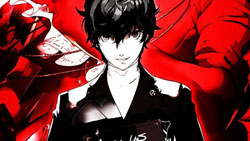Quick disclaimer before I get into this review: I’m a huge Persona fan. I’ve loved the Persona series since I first played Persona 3 in high school, and I’ve played every game in the series since. What makes Persona games great, in my mind, is three things. They all have excellent plots, incredibly complex/detailed character development, and they each have their own unique sense of style unlike anything else – past Persona games included.
In Persona 3, you played as “SEES,” ostensibly a school club, but in actuality the “specialized extracurricular execution squad.” This was a very dark game; core themes of the tile were death and decay, the game’s color palette of dark green and black represented rot. Every night at midnight, players went to war, fighting a losing against a superior, inexhaustible enemy. After Persona 3, Atlus (the game’s developer/publisher) did a complete 180 and released Persona 4, a game about happiness and enjoying the end of one’s childhood. I don’t mean to convey the impression Persona 4 was a bad game though; it was actually outstanding, and in many ways superior to Persona 3. The protagonist, Yu Narukami (or whatever players chose to name him) had to solve a murder mystery and catch the responsible party. At times, the plot got a little dark, but if you’ve ever seen Scooby Doo, you have a basic idea of what the game’s plot was like – lighthearted and idealistic. Many players preferred this sort of plot and as a result, Persona 4 won multiple game-of-the-year awards.
Persona 5’s plot follows a group of outcast troublemakers, shunned by conventional society. If you choose to play Persona 5, there’s one phrase you will get used to hearing, “those awful adults!” There’s the protagonist, who hurt a prominent politician while attempting to stop him from sexually assaulting a woman, and had his life turned upside down as a result. There’s Makoto, who had been groomed to be a lawyer by her successful older sister, but struggles to consolidate her own ideals with the expectations of those around her. Then there’s Ryuji, a former track star, who lashed out at an abusive yet popular teacher, and faced unilateral condemnation from his school. Lastly, there’s Futaba, who was blamed by a number of adults for her mother’s suicide, and developed crippling social anxiety.
Persona 5 is filled with complicated characters like these who come together to form “the Phantom Thieves of Hearts,” a group with Robin Hood-like ideals, except where Robin Hood stole gold, they steal primarily hearts, In the plot of Persona 5, when one’s desires are overly dark and uninhibited, they become distorted, most of the title’s antagonists have such desires. This creates a “palace” which represents said character. The Phantom Thieves invade this mental palace to steal the treasure/heart, the distorted desires themselves, essentially changing the antagonists into normal, healthy people.
Atlus uses psychology to craft the Persona series, which adds to its allure. One of the most interesting aspect of the game’s dungeons, is that they are supposed to represent different cognitions of characters. For example, there was one character who saw people as nothing more than a resource to be exploited. Beyond this, there’s a lot of Jungian psychology specifically, even the series’ title, “Persona” is a reference to the Jungian concept of personas; this is the idea that people use different personalities for different situations.
The Persona series has been praised for its music and visuals, and its latest entry is no exception. There are numerous animated cut scenes, J-pop (Japanese pop) and J-rock make up most of the score. Atlus made the wise decision of hiring an orchestra for its 100+ track soundtrack, and it payed off for them. There’s obviously lots of guitar and drums, but what makes the soundtrack memorable is the violin and organ. There’s also a liberal use of vocals, which is abnormal in video games, and as a result, refreshing.
A common criticism of popular video game series is that they tend to get repetitive after a while, but for Persona 5, this is not an issue. Persona 5 regularly turns edgy, featuring suicides, executions, murders, sexual assault/exploitation, and cases of insanity. The society portrayed in the title is an ugly one, and in many ways, it’s what the game’s Phantom Thieves are fighting against. In previous titles, players fought to protect society, not turn it upside-down, so this particular element goes a long way towards distinguishing Persona 5.
While we’re on the subject of edgy content, players increase their power by executing various personas is some pretty violent ways. Personas are somewhat like Pokémon, except much more adult; they’re meant to symbolize facets of the protagonist’s psyche, and some of them can be quite strange. For example, there’s one that’s basically a goblin sitting on a toilet, and others even more perverse. You can change these persona’s in various ways, fusing them, or turning them into items. This is done by putting them to death with various execution implements. This is meant to be symbolic of suppressing and exposing different sides of one’s personality, but some may still feel that it goes a touch to far.
Unfortunately, given the required time to play through Persona 5 (100+ hours), I found myself having to review it without completing it. That said, given my prior experience with the series, I’m quite confident vouching for this title’s quality. Persona 5 isn’t my favorite Persona entry, but I wouldn’t hesitate to call it the best Persona to date.
I have only two criticisms of Persona 5, and they are both nitpicking. Firstly, it isn’t fully voiced; this means there are lines of dialogue not read by a voice actor. Voice acting is incredibly cheap; I feel that they should have paid for the game to be fully voice acted. It’s possible that having some lines unvoiced was an artistic decision, but if so, I personally disagree with it. Secondly, the anime cut scenes that I’ve seen so far are certainly excellent, but I’ve played other, less successful games with more cut scenes, and I feel like Atlus could have spent more money on this.
These two points aside, Persona 5 is a masterpiece, and due to space constraints, I wasn’t even able to fully extoll its virtues. There’s the new texting feature, which helps character development and increases the feeling or player choice. Then there’s the fact that encounters aren’t random, and you are given fair warning before every fight. Given that this game’s strongpoints are overwhelming and its deficits can be counted on half a hand, I can’t see any other fair rating than 10/10.
IMAGE TAKEN from www.youtube.com




